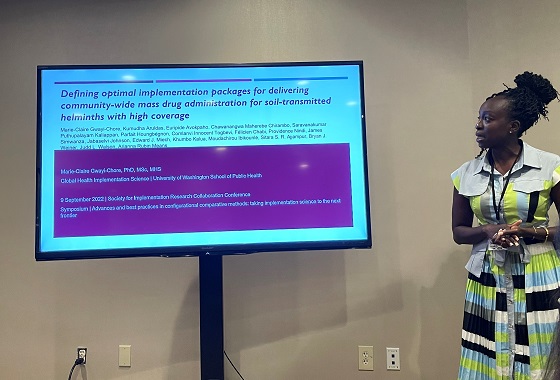January 9, 2023
Dr. Claire Gwayi-Chore presents DeWorm3 findings on optimal delivery of community-wide mass drug administration for intestinal parasitic worm infections

Dr. Claire Gwayi-Chore presents at the 2022 Society for Implementation Research Collaboration Conference.
The DeWorm3 Study recently published findings regarding the cost, acceptability, and optimal delivery of community-wide mass drug administration (cMDA) for or parasitic intestinal worms (soil-transmitted helminths (STH)), in Benin, India, and Malawi. As part of the efforts to disseminate these findings, Dr. Claire Gwayi-Chore, Project Lead of several neglected tropical diseases studies at Global WACh, presented at the Society for Implementation Research Collaboration (SIRC) Conference in San Diego, CA in September 2022. Dr. Gwayi-Chore’s presentation highlighted the objective of the DeWorm3 implementation science (IS) research, to generate evidence of sustainable and scalable deworming models for possible STH transmission interruption.
STH infections have been associated with anemia, malnutrition and delayed cognitive development. Control of these infections is achieved through MDA of high risk populations. Studies suggest that providing MDA to all community members is more effective at reducing the community burden of infection and may be able to interrupt the transmission of these parasites. However, high coverage of cMDA will be required to achieve these goals. As part of the DeWorm3 IS research, process mapping – a systems analysis approach – was conducted to identify the essential inputs for delivering cMDA for STH with high coverage. Over three years of biannual cMDA, IS teams in each site conducted routine process mapping exercises where they tracked the timing and completion of key MDA implementation activities related to drug supply chain, implementer training, community sensitization strategy, MDA delivery duration, and implementation context. Dr. Gwayi-Chore applied coincidence analysis (CNA), a novel cross-case analytical method, to identify specific combinations of the MDA implementation activities that influence high cMDA coverage.
While no individual implementation activity alone was sufficient to achieve high MDA coverage, efficient duration of MDA delivery (within ten days) emerged as a common and essential component for achieving high cMDA coverage when combined with other influential activities, including early arrival of the deworming drug albendazole before the scheduled MDA, a flexible community sensitization strategy, and a conducive implementation context. These findings can help implementers and policymakers identify opportunities to optimize the MDA planning and delivery process. The abstract was part of a larger symposium “Advances and Best Practices in Configurational Comparative Methods: Taking Implementation Science to the Next Frontier,” that was a finalist for the SIRC Award for Best Research-focused Symposium.
Dr. Gwayi-Chore served as a research assistant for DeWorm3 while competing her PhD in Global Health Implementation Science in the Department of Global Health. In her role, she helped develop IS data collection tools and standard operating procedures, facilitated trainings for site IS teams, conducted data analyses and drafted several manuscripts. She has presented DeWorm3 IS research findings in various conferences in addition to SIRC, including the American Society of Tropical Medicine and Hygiene (ASTMH) Annual Meeting and the Annual Conference on the Science of Dissemination and Implementation in Health.
Team members who contributed to DeWorm3’s implementation science research activities include investigators from UW and partner institutions in Benin, India, and Malawi: Sitara S. R. Ajjampur, Kumudha Aruldas, Euripide Avokpaho, Robin Bailey, Félicien Chabi, Chawanangwa Maherebe Chirambo, Parfait Houngbégnon, Moudachirou Ibikounlé, Jabaselvi Johnson, Saravanakumar Puthupalayam Kaliappan, Khumbo Kalua, Adrian Luty, Edward Miech, Providence Nindi, Rachel Pullman, Arianna Rubin Means, James Simwanza, Comlanvi Innocent Togbevi, Judd Walson, and Bryan Weiner.